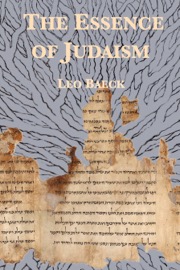 $9.99 on Kindle
$9.99 on Kindle(cover: Susan Erony)
The Essence of Judaism by Leo Baeck (rendition by Irving Howe based on the translation from the German by Victor Grubenwieser and Leonard Pearl of the 1922 edition of Das Wesen des Judentums, 96,000 words)
First published in German in 1905 as Das Wesen des Judentums, Leo Baeck’s The Essence of Judaism is perhaps the most widely read example of German Jewish scholarship in the 20th century. Written as a response to Adolf von Harnack’s lectures Das Wesen des Christentums (The Essence of Christianity), the book seeks to both define the fundamental principles of Judaism, and contrast them with other religions. But by outlining Judaism’s essence, Baeck also shows how the different denominations within Judaism are bound together by fundamental commonalities. Translated into English in 1936, it quickly became a classic in the English-speaking world, and has since been gifted at Bar Mitzvahs and featured on synagogue reading lists. In a world of religious plurality, the book remains highly relevant today.
“The analysis in this masterly volume is set on a high level of historical knowledge, integrity of thinking and religious insight... A life dedicated to religious study and profound spiritual pondering has gone into The Essence of Judaism... [Its] study... is, therefore, valuable not only for attaining a clearer understanding of Judaism but also for achieving a clearer understanding of the background of the great world religions of Christianity and Islam... In the definition of what he regards as the essence of Judaism, [Baeck] often points out wherein it differs from Christianity, Buddhism and other systems of religious teaching.” — David de Sola Pool, The New York Times
“A mature product of German Jewish genius... This beautifully written book may best be described as the swan song of German Jewish scholarship.” — Jacob Agus, Jewish Social Studies
“In Leo Baeck the pith of the man and the writer is dignity, Jewish dignity. As a host in his home, as a guest in other homes, as a preacher in his synagogue, and as the leader of German Jewry within Himmler’s concentration camps, he is and has remained the shining incarnation of those rarest gifts: dignity coupled not with sternness but with radiant warmth.” — David Baumgardt, Commentary Magazine
“This work will give back to many faith in their Judaism and will awaken a desire to immerse further in its study... It is not one of the least merits of this book that it awakens the desire for further instruction and immersion in Jewish scholarship and Jewish life... This work is based on a comprehensive mastery of the biblical and postbiblical literature, draws on other religions, and from belief in the value and mission of Judaism, creates a vivid warmth.” — Heinemann, Monatsschrift für Geschichte und Wissenschaft des Judentums
“This is an unusually important book... Baeck considered himself a ‘liberal’ Jew, but the synagogues in which he preached in Berlin were, by American standards, ‘conservative’... yet after the War he taught at Hebrew Union College in Cincinnati, where ‘reform’ rabbis are trained. Baeck and the book under review bring home to us the utter inadequacy of such labels. It was of his essence to stand above factions.” — Kauffmann, Religious Education
“[The book] presents us [...] with what may briefly, and not altogether inaptly, be described as Prolegomena to Judaism. Within a very moderate compass we have an able characterization of Judaism, an interesting and warm exposition of its leading ideas and peculiarities... Dr. Baeck writes with enthusiasm... The book as a whole is stimulating.” — Wolf, The Jewish Quarterly Review



